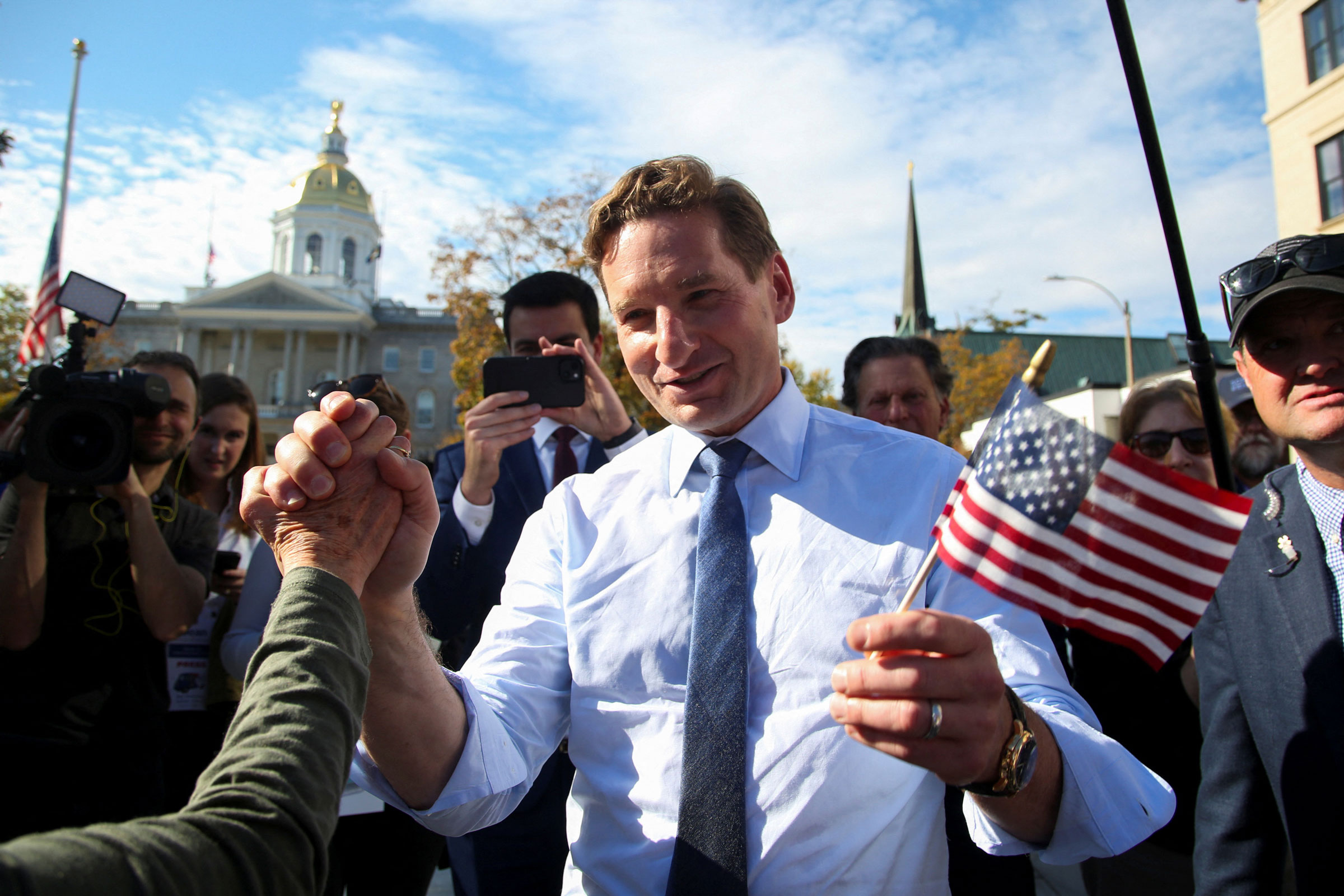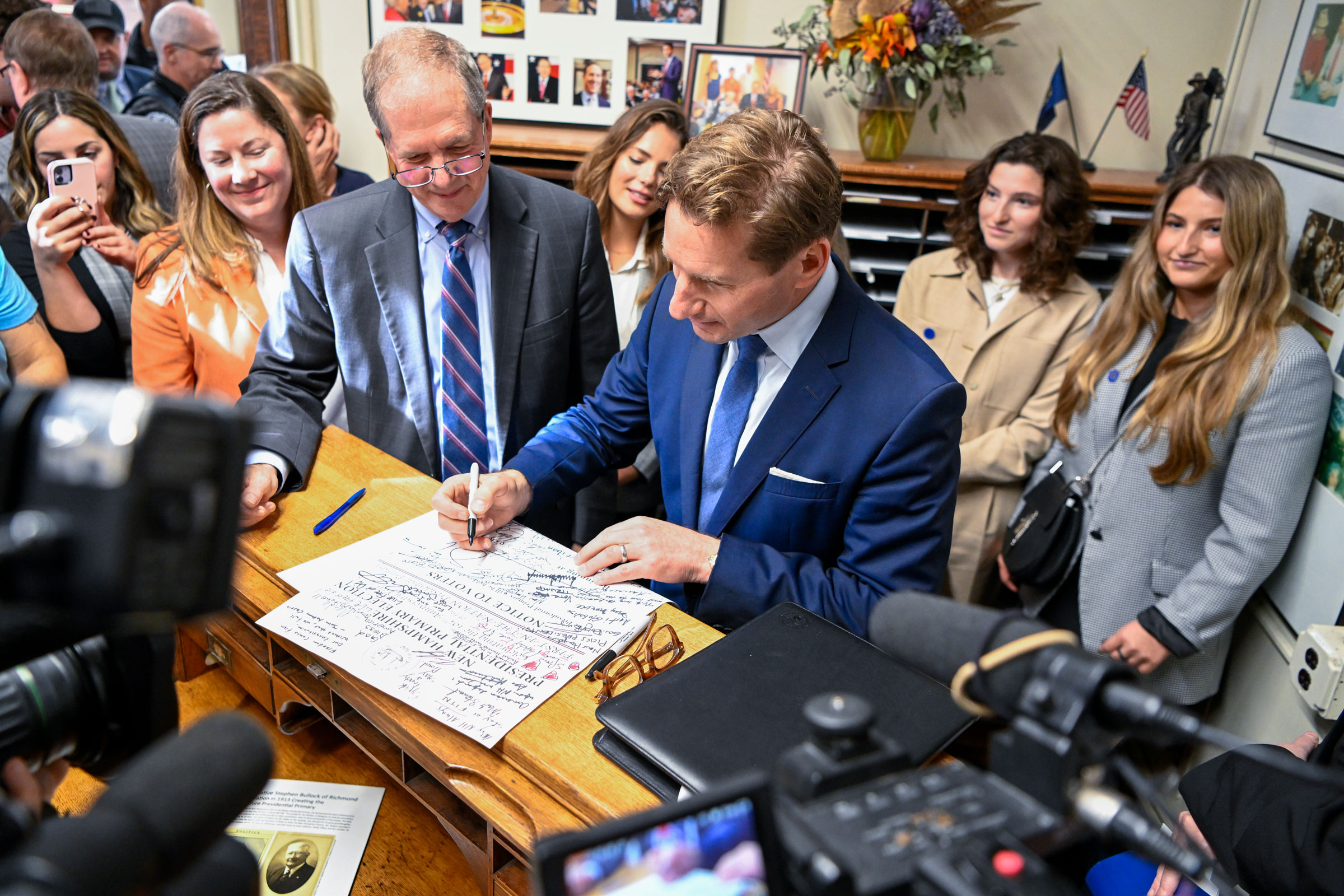
The Other Guy running for President arrives in the basement auditorium of the Dartmouth Political Union with no fanfare. There’s no ripple of electricity through the half-full crowd of political junkies and curious voters, no security or designated press area, and you'd have to squint to find the campaign signs bearing his name. The Other Guy’s pitch for the job is simple: he's running to offer Democratic voters a plausible alternative to the 81-year old incumbent. “I’ve never aspired to be generic,” Dean Phillips, the Democratic congressman challenging President Joe Biden, tells the crowd. But, he says, “I’ll be your generic Democrat if that means I can defeat Donald Trump.”
As a despondent electorate braces for the 2024 campaign, this is what passes for a rallying cry. In poll after poll, a majority of voters—including loyal Democrats—say they’re frustrated with a Biden-Trump rematch and want more options. A recent New York Times/Siena poll found the President trailing Trump in five of six key battlegrounds surveyed. When the pollsters asked about a race between a generic, unnamed Democratic candidate and Trump, those same voters said they favored the other guy over Trump by 8 points.
Phillips, who is 54, with a full head of hair and the vibe of visiting dad on Parents Weekend, has stepped forward to become that Other Guy. In 2022, he was one of the first Democratic officials to call for Biden not to run for re-election. For more than a year, he urged someone—anyone!—to mount a primary challenge to a vulnerable President dogged by inflation, an affordability crisis, and deep, persistent concerns about his age. But the party’s better-known rising stars all took a pass on a long-shot quest to dethrone the incumbent, even as Biden's polling continued to sink. "Within the Beltway, everyone's saying, 'Oh, there's no problem. Just hopes and prayers and everything's gonna work out just fine,'" Phillips told the audience at Dartmouth. "And it's not going to work out fine."
As a candidate to fill the role of Generic Democratic, Phillips is certainly plausible: a wealthy, politically moderate Midwestern congressman with a business background who flipped a conservative House district in 2018. But his bid for President may already be too little, too late. Despite widespread anxiety about Biden, the national Democratic Party has followed tradition by throwing its support behind the sitting President, coordinating closely with Biden's re-election campaign (which is standard when there's an incumbent) and declining to hold sanctioned debates. Phillips is sprinting to build the infrastructure required to mount a competitive campaign, let alone the base of support to sustain one. He has no national fundraising apparatus yet, and will likely need to raise millions of dollars in order to even appear on the ballot across the country. He’s already missed filing deadlines in two states and is struggling to build name recognition. He's polling at 4% in one recent Yahoo/YouGov survey.
Nor is it clear why a Democratic voter would choose Phillips over Biden, other than age. Both reject fire-breathing progressive activism in favor of reaching the exhausted center. Phillips is neither the leader of a new ideological movement, as Sen. Bernie Sanders was in 2016, nor is he running a campaign steeped in Internet-fever-swamp grievances, such as Robert F. Kennedy Jr. is now. According to the political analysis website 538, Phillips has voted with Biden 100% of the time. The premise of Phillips’ campaign is a simple belief that Biden is the only Democrat who would lose to Trump in a rematch.

I met Phillips a week before Thanksgiving, high above midtown Manhattan, in a swanky office he was borrowing from a friend at a hedge fund. While fiddling with the top of his water bottle, he tried to explain why he was so much more than “Biden, but younger.”
Phillips grew up in Edina, Minn. He never met his father, who died in the Vietnam War when he was just six months old; he didn't learn the details of his biological father's death until he was 10. When Phillips was three, his mother remarried into a prominent family that ran the Phillips Distilling Company, known for producing the first American schnapps, and they adopted him as a son and grandson. His adoptive grandmother was the famous advice columnist behind "Dear Abby."
More From TIME
Phillips points to his long career outside of politics as one of the key differences between him and the President. After attending Brown University and earning his MBA at the University of Minnesota, he joined the family business, expanding it to include luxury alcohol like Belvedere vodka. He rose to CEO and ran the company from 2000 to 2012. In 2012, he stepped down to co-manage another investment, Talenti Gelato (his favorite flavor is pistachio), before selling it to Unilever in 2014.
When Trump was elected in 2016, Phillips's daughters, then teenagers, "woke up in tears," he recalls. "I promised them I would do something." In 2018 he ran for a Minnesota House seat that had been in Republican hands for nearly 60 years, and beat a five-term Republican Congressman by more than 10 points. His career in Congress has been a fairly quiet one, without a singular issue that has defined his tenure. He only started really making headlines when, in a July 2022 radio interview, he became one of the first elected Democrats to publicly say that President Biden shouldn’t run for re-election, calling on the incumbent to instead pass the torch to a “new generation” of Democrats.
Read More: Why Dean Phillips Is Running Against Joe Biden.
Phillips stepped down in the fall from a minor role in House Democratic leadership in protest of his party closing ranks around Biden. About a week later, he says, he got a message from the political operative Steve Schmidt, John McCain's former campaign manager, who had started the Lincoln Project to convince Republicans to break from Trump. Phillips went on Schmidt's podcast, and the next day Schmidt called him and suggested he talk to his family about running for President. Phillips did so over the Yom Kippur holiday, and came back to say he was in. But he was concerned about how the campaign would actually work.
"I don't have name recognition. I don't have a national profile. And I just don't see how we could do this within two weeks," he recalls telling Schmidt. "And we sat at my kitchen table, and in two weeks, we stood up a presidential campaign." Just after Thanksgiving, he announced he would not run for re-election to the House.
As President, Philips says, he would be focused on lowering costs for basic necessities like housing, health care, and childcare. While he has supported Biden’s agenda, Phillips says the President's accomplishments have done too little to address the affordability crisis. “The infrastructure bill was important; that's not lowering costs for people. The CHIPS act, very important. That's not lowering costs for people. The Inflation Reduction Act, despite its name, was really a climate bill. That's outstanding, too. But it's not going to lower costs for people,” he says. “If anything, some of these things probably raise costs a little bit.”
To increase affordability, Phillips says he would raise the minimum wage to $15 an hour, back a “national health insurance program”—not for the delivery of care, but for “insurance and payment”—and modify the tax code to allow families to deduct their childcare expenses. “We've not had a President who made housing an all-hands-on-deck priority as I would,” he says, adding that he supports rent vouchers as a “band-aid” but that “the solution is production: we need to be building more.”
Phillips points to daylight between himself and Biden on immigration, where he proposes to change the U.S. asylum process by filing cases in migrants’ countries of origin, and cannabis, which he wants to legalize. He says he "absolutely" uses cannabis himself. “I smoke it. In the last year, I certainly have,” he says, adding: “I haven’t now since my campaign started, and I won’t do it during my campaign and as President.”
Phillips’s critiques of Biden remain fairly gentle. Most of his argument is rooted in polling that suggests Americans are ready for a change. He is not out to impugn the President’s character or dismiss his accomplishments. “I respect him. I think he's a good man. I think he was the only one who could have beat Donald Trump in 2020,” Phillips says. “And I believe he is the only moderate Democrat who could possibly lose to Donald Trump in 2024. And it appears that he will.”
The President is “at the very sunset of his life, let alone his career,” Phillips continues. “There are not many 80-plus-year-olds in leadership positions in any category, in any industry, in any capacity around the world.”

Phillips’ brain trust includes a group of political operatives who have almost nothing in common except for their skepticism of establishment Democrats and their desire to beat Donald Trump. Phillips calls them his “team of rivals.” There’s senior advisor Jeff Weaver, who ran Sanders’ 2016 campaign and advised his 2020 run; campaign manager Zach Graumann, who served in the same role for Andrew Yang’s campaign in 2020; and Schmidt, who recently departed the team in order to start a new super PAC, Pass the Torch USA, to support Phillips.
This team sees a path to an upset. Biden is not appearing on the ballot in New Hampshire because the Democratic National Committee reordered its calendar to give South Carolina the first primary; New Hampshire refused to move their primary, and Biden chose not to buck the party by appearing on the New Hampshire ballot. Phillips sees a victory there, even with an asterisk, as key to his campaign, and his aides see a glimmer of good news in a Nov. 15 Emerson College poll of New Hampshire voters, which found that just 27% plan to write in Biden's name, with Phillips polling at 15% just a few weeks into his launch. A plurality of the respondents— 44%—say they’re still undecided. “Among Democratic voters in New Hampshire, if the President loses or comes close to losing, it’s a clear message,” says Weaver.
Read More: Biden's Shrunken Legislative Agenda.
Another pillar of Phillips’ early-state strategy is Michigan. “Supporters of the President would list his perceived electability against Trump as one of the justifications for him running again and being the nominee,” says Weaver. “A strong showing by Congressman Philips in Michigan would cause people to perhaps rethink that assumption.” The team hopes that a win in New Hampshire can create momentum in the primary, while a good performance in Michigan would demonstrate Phillips's electability in a critical battleground.
To stay competitive, Phillips will need to raise millions of dollars to overcome his lack of name recognition. He's vowed not to take money from lobbyists, but hasn’t gotten much traction courting traditional Democratic big-dollar donors, so he loaned his campaign $2 million out of his own fortune in early November. The campaign believes that a win in New Hampshire will lead to a significant fundraising boost, as Pete Buttigieg experienced in 2020.
Phillips says he’s had a series of conversations with the Silicon Valley tech titan Sam Altman about potentially supporting his campaign. "We've talked about the country, we've talked about the need for change," he says. In their conversations, which Phillips says have included "a number of calls and Zooms," Altman, the CEO of OpenAI, "shared some interesting perspective about how artificial intelligence could significantly reduce costs in the United States, as relates to health care costs, as it relates to any data processing …there's remarkable potential," Phillips says. While he won’t say that Altman has pledged financial support, “he has certainly been a source of great counsel, ideation, and perspective," Phillips says.
Phillips is on the ballot in at least 13 states and territories so far, according to a senior campaign aide, but he's already missed ballot deadlines in Nevada and Kentucky and at this point Florida plans not to hold a primary. Phillips is still waiting to learn whether he'll make the ballot in California and North Carolina, but his campaign says it's confident in his chances. The scramble to simply appear on these ballots, however, means pouring limited campaign money into canvassers in those states. “We're gonna get on as many ballots as possible. But I'm not saying we're good on all ballots, because I did not know how unbelievably rigged the system is,” Phillips says. “Getting on the ballot is probably the most significant challenge I face.”
Phillips says he is determined not to play spoiler. He plans to “assess” the state of the race after Super Tuesday in early March, “and if I'm not in a position to win, I would get behind whoever is best positioned to beat Donald Trump.” But the source familiar with the campaign says that with the number of states where he'll be on the ballot, the Phillips campaign plans to be at the Democratic convention next summer with delegates, even if they don't outright win any states. "He's going to stay in as long as it takes for the party to get an accurate assessment of who is best able to beat Donald Trump," says Weaver.
Phillips is not interested in discussing the specific conditions that would cause him to drop out of the race. Instead, he's focused on calling on Biden to "pass the torch" to new leadership. “That's my invitation to Democratic voters: to assess what this is really about,” Phillips says. “It's not about a personality contest. It's not about rewarding someone who did a nice job four years ago. It's about moving to the future and preventing the most dangerous man in the world from returning the White House.”
Before the stop at Dartmouth, Phillips visits Lou’s Diner in Hanover, a burger-and-milkshake spot that specializes in freshly made pies. It’s mid-November, just two weeks since he announced his candidacy, and his campaign is so new that most people don’t know who he is.
“If there was another realistic Democratic alternative, I’d vote for them instead of Biden,” says William O’Malley, a Dartmouth sophomore who spoke with Phillips as he waited for his burger to arrive. But he remained “skeptical” of Phillips’ chances.
More Must-Reads from TIME
- Cybersecurity Experts Are Sounding the Alarm on DOGE
- Meet the 2025 Women of the Year
- The Harsh Truth About Disability Inclusion
- Why Do More Young Adults Have Cancer?
- Colman Domingo Leads With Radical Love
- How to Get Better at Doing Things Alone
- Michelle Zauner Stares Down the Darkness
Write to Charlotte Alter at charlotte.alter@time.com